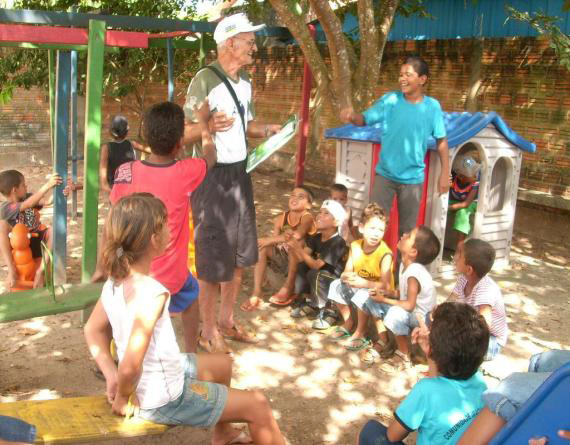
Brother Delvino Decezero
Delvino Decezero is a Marist Brother who spent 26 years as a missionary in the District of Amazonia. He returned to the Province of Rio Grande do Sul at the end of 2014. In this interview, conducted by Brother Sebastião Ferrarini, he tells us about his experience as Marist missionary.
Where did you carry out your mission?
It began in the city of Benjamin Constant, State of Amazonas, from 1988 to 1998. In 1999, I was sent to the interprovincial community of Manaus, where I stayed until 2003. In 2004 and 2005, I was in Tarauacá, State of Acre. From January to April 2006, I went to Canutama, in the Purus River Valley, to close down the community. From 2006 to 2008, I was in the community of Porto Velho. From 2009 to 2011, I lived in Ji-Paraná, State of Rondônia. Since 2012, I am in Porto Velho.
We know about your hard work in the Marist District of Amazonia all these years. Why did you come to Amazonia in the first place?
At that time, the Province of Porto Alegre was doing a beautiful pastoral work in two different areas of Alto Solimões: the Advanced Campus of the Pontifical Catholic University of Rio Grande do Sul, and the brothers’ community. I once spent a week there together with Brother Inácio Etges on the way back from Colombia, where we visited the REMAR project. Ten years later, I was invited to work in the region, and accepted with no hesitation.
What have been your main work areas?
In Benjamin Constant, I worked on three meaningful areas. The most important was the attention to students who came from five schools in the city, morning and afternoon, to the Champagnat Center. We taught 4 or 5 groups a week, and I say “we” because there were always a couple of brothers working there. I worked as youth ministry advisor for the diocese and the city youth groups. Training catechists was also part of my work. There was no community of brothers or sisters in Tabatinga at that time, so I had to direct many catechesis courses myself.
When I was in Manaus, the Provincials, along with a representative from each sector of the four Provinces working in the region, asked me to organize the Assembly that was to be held in January 2000.
A Superior and two counselors were elected in that Assembly. The task of Superior fell to me, and Brothers João Gutemberg and Gentil Meneguzzi became counselors. The Council’s main task was to organize the establishment of the AMD (Amazonia Marist District), a new structure that was to come into effect in late July 2002. The District would include 10 communities, with 37 Brothers.
In Tarauacá, State of Acre, my main apostolate was the Pastoral Care of the Elderly. A group was already running. I organized four more groups, one in each neighborhood. I acted as Adviser to the groups. We founded the Elderly People Council of the city.
Was there any crucial fact, something especially meaningful in your work experience in this area?
In the city of Benjamin Constant, in May and November each year, I used to pray the Rosary in people’s houses on Marcellin Champagnat Street. During the day, the family that had hosted the image of Our Lady was in charge of carrying it to the next house and motivating the neighbors to participate in our prayer meeting. I did this for nine years. It was one of the most meaningful apostolic activities I ever lived, as well as the morning and afternoon formation sessions held in the same city for nine years.
What were the most important challenges you faced?
- The job as Superior for a three-year term to establish and organize the AMD.
- The so-called “annual sending”, that is to say, publishing the list of appointments each year.
- Closing the community of Atalaia do Norte.
- Taking the first steps to establish a community of brothers in Rio Branco that could be “a symbol of newness”.
- Directing the Marist Social and Educational Center (with the Portuguese acronym CESMAR) in Porto Velho, which lacked an adequate infrastructure, and had many needs.
- Closing the communities of Canutama and Ji-Paraná.
Now back to your homeland, Rio Grande do Sul, what would you say was your most meaningful experience in Amazonia?
After contemplating the immense rivers and forests in Amazonia, insignificant ideals and small undertakings were just not enough for me.
Another important experience was the opportunity to live and work with people from the States of Amazonas, Acre and Rondonia.
What would be your message to those who continue the mission in Amazonia?
When we established the AMD, brothers insistently asked for a community that could be “a symbol of newness”. It was founded in Rio Branco, State of Acre.
My message would be that each AMD community should try to be a “symbol-of-newness community”, which is also the Congregation’s current proposal during the Bicentennial celebration.
When the AMD started, we wrote a text entitled A Curumim’s Dream (“curumim” means “child” in Tupi-Guarani language) summarizing the kind of brother we wanted in Amazonia. I hope this document does not go lost and really becomes true.
_________________
Bro. Delvino Decezero
From the District Bulletin: Toques do tambor amazônico, 159 (Amazonas Drumbeat, 159).
